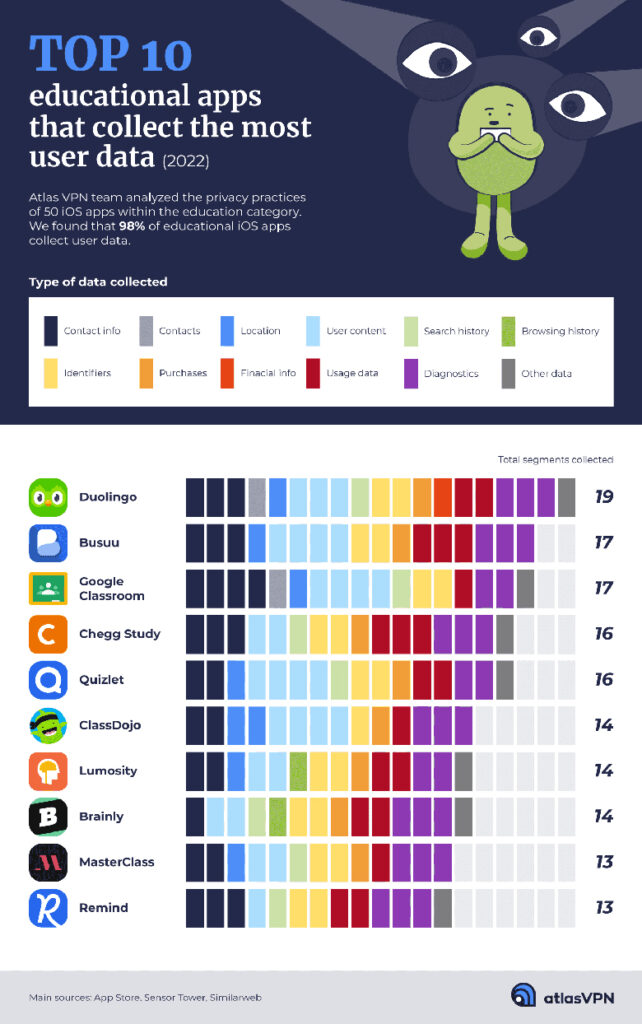Educational apps are popular year-round, but they come in especially handy with the start of the school season. However, while they may benefit you or your kids’ learning, they might harm your privacy. To help mobile users understand what personal information such apps collect, the Atlas VPN team decided to investigate the privacy of popular educational apps.
The Atlas VPN team found that 98% of iOS apps within the education category collect user data. On average, one educational application for iOS harvests data across more than 8 data segments, such as name, email, phone number, location, payment information, and search history, to name a few.
Duolingo, the leading language learning app, came out on top as the most data-hungry, collecting user information across 19 segments. Yet another language learning app Busuu and the learning platform Google Classroom are also not far behind with 17 data segments.
A segment is a data point such as name, phone number, and precise location that are grouped in broader data types such as contact information, financial information, and location. In total, Apple’s App Store distinguishes 14 data types and 32 segments.
98% of iOS apps within the education category collect user data
For this report, the Atlas VPN team analyzed the App Store privacy labels of 50 popular iOS apps within the education category. The apps were ranked based on how many personal user information segments they collect. Some analyzed apps collect data that cannot be linked back to a user’s identity, labelled ‘data not linked to you’ in the App Store. Such data segments were not included in the total count.
The apps for analysis were picked from various top iOS application charts for 2022, including Sensor Tower and Similar Web. The analyzed apps include a mix of ed-tech apps, virtual classroom apps, study help, language, and musical instrument learning apps, educational games, online course apps, and book reader apps.
The third spot on the list is occupied by gamified online learning tool Chegg Study and flashcard solution Quizlet. These apps gather information from 16 data segments.

Educational apps such as Duolingo, Google Classroom, ClassDojo, Brainly, Remind, and MasterClass were also found to be among the top offenders
Other prominent data collectors include communication app for teachers, parents, and students ClassDojo (14), brain training game app Lumosity (14), knowledge-sharing student community app Brainly (14), online education subscription platform MasterClass (13), and education communication app Remind (13).
Educational apps such as Duolingo, Google Classroom, ClassDojo, Brainly, Remind, and MasterClass were also found to be among the top offenders in our Android app study.
What Data are Apps Collecting?
Additionally, 42% of apps harvest purchase data, such as payment history, 28% do so with location data, including coarse and precise location, and 22% of apps with search history.
While to a lesser extent, browsing history is also gathered by educational applications. Overall, 6% of apps within the category obtain such data. Other collected data types include contacts at 4% and financial info, such as payments information at 2%.
Only one app (2%) was found not to gather any user data, while two apps (4%) were found only to collect information ‘not linked’ to the user.
The top data use purpose is app functionality (86%), followed by analytics (80%), personalization (56%), and developer’s advertising or marketing (54%). Nearly a quarter (24%) of apps use the collected data for third-party advertising.
Identifiers, such as user ID and device ID, are the most frequently collected personal data type at 88%
The picture is clear: most apps collect data in one way or another. While not all of them do so for nefarious purposes, such as sharing it with third parties and data brokers, knowing what kind of data apps gather can help you decide whether you want to continue using those apps or change to more privacy-conscious alternatives.
When it comes to the types of data that apps collect, there is a lot of variation. However, some types are more common than others.
Identifiers, such as user ID and device ID, are the most frequently collected personal data type at 88%, followed by contact information, such as name, email, phone number, or physical address, at 84%.
Out of the studied apps, 74% also gather usage data, such as product interactions, 64% of apps collect user content, such as audio data, photos, or videos, meanwhile 52% garner diagnostic information.






